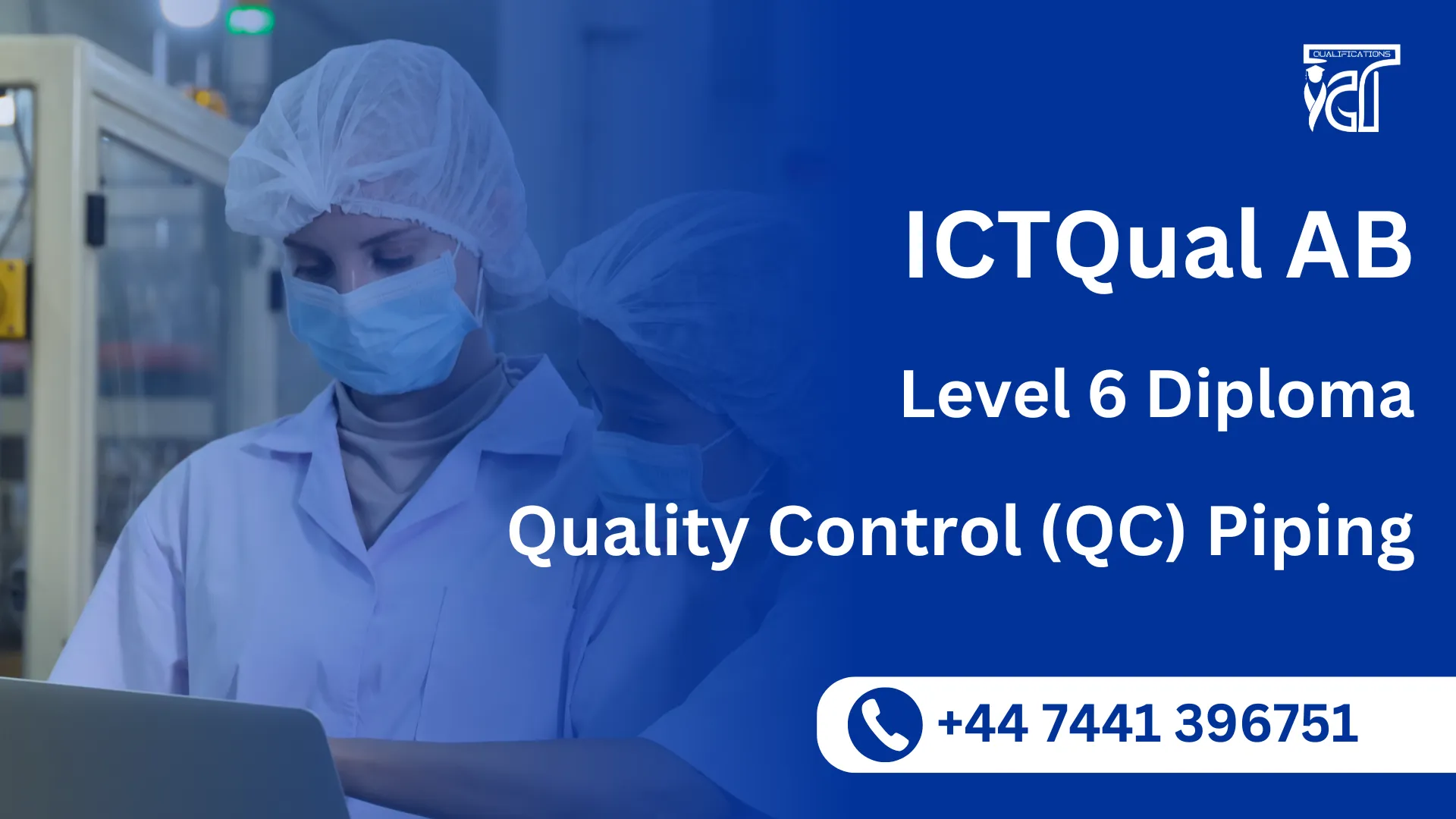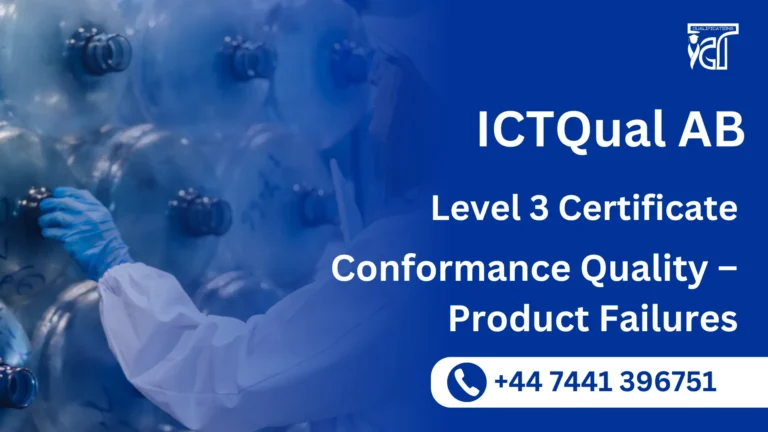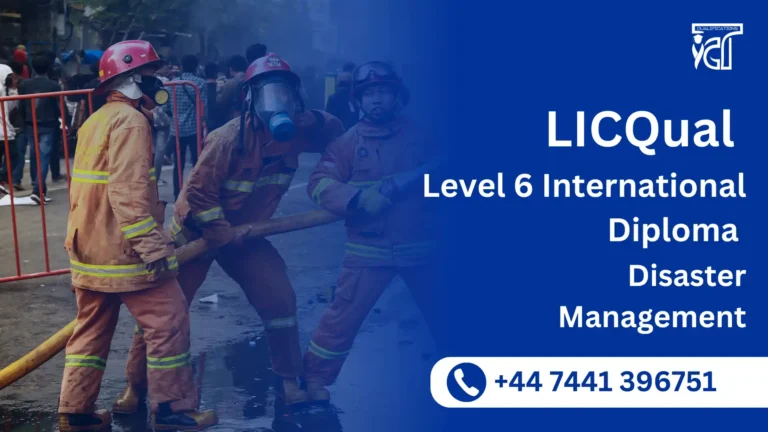The ICTQual AB Level 6 Diploma in Quality Control (QC) Piping is designed to provide learners with advanced knowledge and practical expertise in the inspection, monitoring, and assurance of piping systems across diverse industrial sectors. This program emphasizes the critical role of quality control in ensuring the safety, reliability, and efficiency of piping installations, which are integral to industries such as oil and gas, petrochemicals, power generation, and manufacturing. By combining theoretical foundations with applied methodologies, the diploma equips participants with the skills to identify defects, enforce compliance with international standards, and implement effective quality management strategies.
A key focus of the course is the integration of modern inspection techniques and quality assurance frameworks into piping projects. Learners will explore topics such as material selection, welding procedures, non‑destructive testing (NDT), and adherence to codes and standards like ASME, API, and ISO. The curriculum also highlights the importance of documentation, reporting, and auditing processes, enabling professionals to maintain transparency and accountability in quality control operations. Through case studies and industry‑based scenarios, participants gain the ability to evaluate risks, troubleshoot issues, and recommend corrective actions that align with global best practices.
This diploma is particularly valuable for professionals seeking to advance their careers in piping engineering, project management, or quality assurance roles. It fosters analytical thinking, problem‑solving, and leadership skills, preparing candidates to take responsibility for quality outcomes in complex projects. The program also emphasizes the ethical and regulatory dimensions of quality control, ensuring that learners understand the broader implications of their work on safety, sustainability, and organizational reputation. By bridging technical expertise with managerial insight, the course creates well‑rounded professionals capable of driving continuous improvement in piping systems.
Ultimately, the ICTQual AB Level 6 Diploma in Quality Control (QC) Piping serves as a pathway to higher qualifications and specialized certifications in quality assurance and engineering disciplines. It empowers learners to contribute meaningfully to their organizations by enhancing operational efficiency, reducing costs associated with rework or failures, and safeguarding human and environmental well‑being. With its comprehensive approach, the diploma not only strengthens technical competence but also builds confidence to lead quality initiatives in global industrial contexts.
ICTQual AB Level 6 Diploma in Quality Control (QC) Piping
This qualification, the ICTQual AB Level 6 Diploma in Quality Control (QC) Piping, consists of 6 mandatory units.
| Sr# | Unit Title |
| 1 | Lead Auditor Responsibilities in Piping QC |
| 2 | Managing QC Teams and Workflows |
| 3 | Quality Engineering Principles in Piping |
| 4 | Developing and Implementing QC Plans |
| 5 | Regulatory and Legal Frameworks in QC Practices |
| 6 | Integrated Piping Quality Management Systems |
Learning Outcomes for the Study Units:
1. Lead Auditor Responsibilities in Piping QC
By the end of this unit, learners will be able to:
- Plan, conduct, and report internal and external audits within piping quality control systems.
- Evaluate organisational compliance against international standards (e.g. ISO 9001, ASME, API).
- Manage non-conformance findings and lead follow-up actions and verification audits.
2. Managing QC Teams and Workflows
By the end of this unit, learners will be able to:
- Organise and lead multidisciplinary QC teams on complex piping projects.
- Allocate resources effectively and monitor workflow efficiency.
- Resolve team-based challenges and maintain quality performance under pressure.
3. Quality Engineering Principles in Piping
By the end of this unit, learners will be able to:
- Apply advanced quality engineering methodologies such as Six Sigma and FMEA in piping systems.
- Analyse process variations and implement data-driven quality improvements.
- Optimise inspection systems using engineering-based problem-solving techniques.
4. Developing and Implementing QC Plans
By the end of this unit, learners will be able to:
- Design comprehensive QC plans aligned with project objectives, codes, and client requirements.
- Integrate inspection checkpoints, test procedures, and documentation protocols.
- Oversee successful implementation of quality plans across multidisciplinary teams.
5. Regulatory and Legal Frameworks in QC Practices
By the end of this unit, learners will be able to:
- Interpret legal and regulatory obligations in relation to quality control of piping systems.
- Ensure full compliance with statutory requirements in local and international jurisdictions.
- Address legal risks and document quality actions for audit and legal defensibility.
6. Integrated Piping Quality Management Systems
By the end of this unit, learners will be able to:
- Design and manage an integrated quality management system tailored to complex piping operations.
- Align QA/QC systems with broader organisational goals and performance indicators.
- Drive continuous improvement, audit readiness, and strategic compliance using integrated systems.
The ICTQual AB Level 6 Diploma in Quality Control (QC) Piping is designed to enhance professional expertise in piping inspection, monitoring, and compliance. It prepares learners to ensure safety, reliability, and efficiency in piping systems across industries such as oil and gas, petrochemicals, power generation, and manufacturing. The program blends technical knowledge with practical application, enabling participants to take on leadership roles in quality control and assurance.
Technical Competence
- Advanced knowledge of piping materials and their properties for quality assurance
- Expertise in welding inspection and procedure qualification to meet industry standards
- Application of non‑destructive testing (NDT) methods for defect detection and prevention
- Understanding of international codes such as ASME, API, and ISO for compliance
- Ability to evaluate piping designs for safety, durability, and performance
- Hands‑on training in inspection tools and techniques used in modern industries
Professional Growth
- Enhanced career opportunities in QA/QC, piping engineering, and project management
- Recognition of skills through an internationally benchmarked qualification
- Development of leadership qualities to manage quality teams and projects
- Improved problem‑solving skills for addressing piping failures and risks
- Capacity to supervise inspections and audits with confidence
- Preparation for higher certifications in quality assurance and engineering
Industry Relevance
- Alignment with global industry practices in oil, gas, and petrochemical sectors
- Contribution to operational efficiency by reducing rework and failures
- Knowledge of sustainability standards ensuring environmental and safety compliance
- Ability to implement quality frameworks that meet organizational goals
- Exposure to real‑world case studies and industrial scenarios
- Strengthened documentation skills for reporting, auditing, and compliance records
Personal Development
- Confidence to lead quality initiatives in complex piping projects
- Improved analytical thinking for evaluating risks and corrective actions
- Ethical awareness in maintaining safety and compliance standards
- Adaptability to diverse work environments across global industries
- Enhanced communication skills for effective reporting and stakeholder engagement
- Commitment to continuous improvement in quality control practices
The ICTQual AB Level 6 Diploma in Quality Control (QC) Piping is tailored for individuals who aspire to build advanced expertise in piping inspection, monitoring, and compliance. The ideal learner is someone motivated to take responsibility for quality outcomes in complex industrial projects, with a strong interest in technical precision, safety standards, and global best practices. This program suits professionals aiming to progress into leadership roles in QA/QC and piping engineering while remaining accessible to candidates from diverse backgrounds who demonstrate commitment and analytical ability.
Technical Background
- Learners with prior exposure to engineering, piping, or construction environments
- Professionals familiar with welding, fabrication, or inspection processes
- Individuals seeking to strengthen knowledge of international codes such as ASME, API, and ISO
- Candidates interested in mastering non‑destructive testing (NDT) techniques
- Those with practical experience in industrial projects requiring quality assurance
- Participants eager to apply technical skills to real‑world case studies
Career Aspirations
- Professionals aiming for career advancement in QA/QC, piping engineering, or project management
- Individuals seeking recognition through an internationally benchmarked qualification
- Candidates motivated to take on supervisory or leadership roles in quality control teams
- Learners preparing for higher certifications in engineering and quality assurance
- Those committed to long‑term career growth in oil, gas, petrochemical, or manufacturing sectors
- Participants who value continuous professional development and industry relevance
Personal Qualities
- Learners with strong analytical and problem‑solving skills
- Individuals demonstrating attention to detail and precision in technical tasks
- Candidates with effective communication skills for reporting and stakeholder engagement
- Professionals who value ethical responsibility and safety compliance
- Adaptable individuals capable of working in diverse industrial environments
- Participants motivated by continuous improvement and innovation in quality practices
Academic and Language Readiness
- Learners with a good command of English, recommended at CEFR A2 level or equivalent
- Candidates able to comprehend technical documentation and industry standards
- Individuals prepared to engage with both theoretical and practical learning formats
- Professionals comfortable with structured assessments, case studies, and project‑based tasks
- Those willing to balance study with professional commitments through flexible learning modes
- Participants ready to contribute actively to discussions, audits, and quality initiatives
Completion of the ICTQual AB Level 6 Diploma in Quality Control (QC) Piping opens doors to advanced qualifications, specialized certifications, and diverse career opportunities across global industries. Learners gain not only technical expertise but also a recognized credential that supports progression into senior roles, further study, and international pathways in engineering and quality assurance.
Academic Progression
- Pathway to advanced diplomas in piping engineering, welding technology, or industrial inspection
- Eligibility for specialized certifications such as ASME, API, ISO, and NDT Level II/III
- Opportunity to pursue higher‑level qualifications in quality management and engineering disciplines
- Access to structured learning routes in project management and industrial safety
- Preparation for postgraduate‑equivalent studies in technical and management fields
- Strengthened foundation for research or teaching roles in QA/QC and engineering
Career Progression
- Advancement into senior QA/QC engineer or piping inspector positions
- Opportunities to lead quality control teams in oil, gas, petrochemical, and power sectors
- Roles in project management with responsibility for quality assurance frameworks
- Increased employability in international projects requiring compliance with global standards
- Potential to work as independent consultants or auditors in quality control
- Career mobility across industries such as construction, manufacturing, and energy
Professional Development
- Recognition as a qualified professional with international credibility
- Enhanced ability to contribute to organizational efficiency and safety compliance
- Development of leadership and supervisory skills for managing complex projects
- Access to continuous professional development programs and industry workshops
- Networking opportunities with global professionals in QA/QC and engineering fields
- Strengthened profile for participation in international tenders and contracts
Long‑Term Pathways
- Progression toward chartered or licensed engineer status in relevant jurisdictions
- Opportunities to specialize further in advanced inspection technologies and digital QA systems
- Potential to transition into senior management roles in quality assurance and operations
- Contribution to sustainability initiatives through quality frameworks in industrial projects
- Ability to influence policy and standards development in piping and quality control sectors
Entry Requirements
Learners must meet the following criteria to be considered for admission into the course:
- Age Requirement: Minimum age of 18 years or above
- Educational Background: Completion of a Level 5 Diploma or equivalent qualification in engineering, technical, or industrial fields. Candidates with prior study in mechanical engineering, piping technology, or quality assurance are strongly encouraged
- Work Experience: At least 2–3 years of relevant industry experience in piping, QA/QC, welding, fabrication, or inspection roles. Practical exposure to industrial projects requiring compliance with codes and standards such as ASME, API, and ISO is highly valued
- English Language Proficiency: Good command of spoken and written English is required, recommended at CEFR B2 level or equivalent (IELTS 5.5–6.0 or similar). International learners may be asked to demonstrate proficiency through recognized language tests
Register Now
Qualification Process
Qualification Process for the ICTQual AB Level 6 Diploma in Quality Control (QC) Piping
- Self-Assessment:
Begin by evaluating your eligibility to ensure you meet the qualification requirements, including work experience, knowledge, and language proficiency. - Registration:
Complete your registration by submitting the required documents, including a scanned copy of a valid ID, and paying the registration fee. - Induction:
An assessor will conduct an induction to confirm your eligibility for the course and explain the evidence requirements. If you do not meet the criteria, your registration will be cancelled, and the fee will be refunded. - Assignments & Evidence Submission:
Provide all assignments and the necessary evidence based on the assessment criteria outlined in the course. If you are unsure of the required evidence, consult with the assessor for guidance on the type and nature of evidence needed. - Feedback and Revision:
The assessor will review your submitted evidence and provide feedback. Evidence that meets the criteria will be marked as “Criteria Met,” while any gaps will be identified. You will be asked to revise and resubmit if needed. - Competence Evidence:
Submit final evidence demonstrating that all learning outcomes have been met. This evidence will be marked as “Criteria Met” by the assessor once it is satisfactory. - Internal Quality Assurance (IQA):
The Internal Quality Assurance Verifier (IQA) will review your evidence to ensure consistency, quality, and compliance with standards. - External Verification:
The IQA will submit your portfolio to ICTQUAL AB External Quality Assurance Verifiers (EQA) for final confirmation. The EQA may contact you directly to verify the authenticity of your evidence. - Certification:
Upon successful completion of all checks, ICTQUAL AB will issue your official certificate, confirming that you have attained the ICTQual AB Level 6 Diploma in Quality Control (QC) Piping







